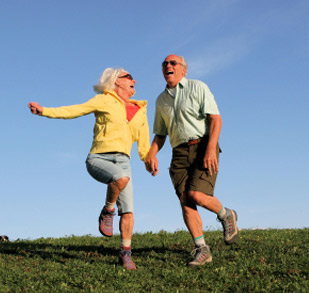Coaching The “Boomer Generation” for Aging Well

Every seven seconds a “Boomer” turns fifty. The American post-war “Boomer Generation” spends more on health care than their parents did.
They visit the doctor more, they consume more services, and aren’t afraid to use their $7 trillion in collective wealth to improve their quality of life. From physical therapy, to cosmetic surgery, to the latest in life-saving technology, Boomers just aren’t built to grow old gracefully or go “quietly into the night.” Their impact on the marketplace for health and wellness products and services is huge and unprecedented, and wellness coaching may just be on their shopping list.
Boomers live longer, but the debate goes on whether they are healthier or not. It is like the tale of two generations in one. Our stereotype of the generation is like most stereotypes, usually misleading. We think of the Boomers as the same folks who went to college in the late sixties and projected an image of rebelliousness, and social consciousness. While this generation did acquire more education than any previous, not everyone went to college, and not all became the health conscious, socially and environmentally aware folks that describe the icon the current media might portray.
They are in fact quite a paradoxical group to look at. While on the one hand there are plenty of physically active, health food conscious “oldsters” in Yoga classes and out on the bike and hiking trails, especially in some parts of the country, many folks the same age are living a very different lifestyle. The Boomers, as a whole, are far more obese, are under more stress at work, and are retiring later, if at all. They are much more sedentary than any previous generation driven by more jobs that limit movement and have longer commutes. While they don’t smoke as much, they self-report being less physically healthy than their parents. They watch more TV and even their recreational pursuits can go either people-powered or “full throttle” (i.e. sitting down revving some kind of engine).
Helping this enigmatic generation create a healthy future takes on two aspects, the individual and the sociological. When we look at long-lived cultures around the world, like the National Geographic-funded Blue Zones project does (www.bluezones.com ), we see cultures that have in place healthy norms and lots of social support. People in all of these longevity hot spots make lots of movement a natural part of their daily lives. They live with meaning and purpose and a strong sense of spirituality. They eat wisely and “belong to the right tribe”. They honor and keep elders within their community. Social isolation is a health risk for all, and only increases in threat as we get older. The challenge is for us to build the kind of families and communities that support being well not just while we’re young, but for our entire lives.
Once again, “coaching for connectedness” may take center stage. Making the goal of obtaining greater social support a central part of a client’s Wellness Plan may be the most helpful thing they experience in wellness coaching.
COACHING BOOMERS – Three Ideas
# 1 – Never assume they are retired, or are even retiring anytime soon. Chances are your client who is still at least in their sixties, is still employed full-time. In fact they may be headed into the most productive time of their lives. Let’s call them late-bloomers. For them Work-Life Balance Coaching is a greater need than ever. Furthermore it may be complicated by some factors of aging keeping them from performing like they would like to, or being able to get the most out of the limited time they have for exercise and self-care. If they are taking medication that makes weight loss more challenging, or are recovering from surgeries, etc. (joint repair and replacement is more and more common with this group) they may not be able to be as “efficient” in their activities to maintain their health. Exploring this in coaching and helping them to create new strategies may become a really valuable use of coaching.
Many of this generation have also found themselves facing retirement with financial problems instead of reserves to draw upon. For them, healthcare issues and wellness lifestyle choices may revolve around expenses, especially for the pre-Medicare group. They may really benefit from coaching that can help them keep their health a priority in the face of the frightening costs of healthcare.
#2 – Coach around the subject of meaning and purpose. Some folks are fortunate and either find meaning and purpose in work they continue to do, or have lived full lives where they have developed rich sources of meaning and purpose outside of their careers. For others “retirement” may result in such feelings losing their anchor. Without a solid sense of meaning and purpose in one’s life there is less motivation to engage in a really healthy lifestyle. Help your client search in directions that align with their values and interests. Reconnecting with old interests, becoming active in organizations, volunteering with non-profits may all bridge this gap in a meaningful way. This may be a great time in life for developing the spiritual side of one’s self. Coach your client through the steps of exploring such new pursuits and following through on creating “experiments” to find something that works for them.
#3 – Always explore the issue of connectedness. Never assume that your client has friends and family that can or will support their efforts at improving their lifestyle. More and more seniors are living alone, especially as spouses die and children move away. Many others have relocated themselves to places where the challenge is establishing a whole new circle of friends.
“Studies have shown that people who are isolated and lonely have a higher incidence of health problems. A 1998 study of patients with heart disease found that 50 percent of the patients who reported feeling very isolated were not married and had no one in whom they could confide died within five years. During the same time span, only 17 percent of those with either a spouse or confidant died. Another 1998 study on women found that symptoms of depression and lack of social support were associated with more heart attacks, open-heart surgeries and deaths from cardiovascular disease. A report has found that seniors, who attend church at least weekly, live longer.” (http://seniorhealth.about.com/od/mentalemotionalhealth/a/lonely.htm)
Also, don’t assume that social networking online is not in the picture. Many boomers are quite tech-savvy, certainly more than any other group of oldsters ever has been. Folks with chronic illnesses may find both information and online groups of others sharing the same health challenges. Whether it is through something online, participating in a Senior Center’s programming, or engaging in community groups in align with their interests, it’s all good.
The individual aspect, again comes back to lifestyle choices, conscious awareness and realizing that we are in charge of our own health. A big part of it is realizing that we can and do affect our own health. Building that confidence, that self-efficacy is crucial. Making the individual decision to connect with others and build a sense of healthy community may create yet another paradox, but one that works for us.

My grandpa, he's 95
And he keeps on dancin'
He's still alive
My grandma, she's 92
She loves to dance
And sing some, too
I don't know
But I've been told
If you keep on dancing
You'll never grow old
Come on darling
Put a pretty dress on
We're gonna go out tonight
Dance, dance, dance
Dance, dance, dance
Dance, dance, dance
All night long
"Dance, Dance, Dance" - The Steve Miller Band
What’s your experience coaching this aging “Boomer” generation? Please share in your comments here on the blog.








Only registered and logged in readers can leave comments.